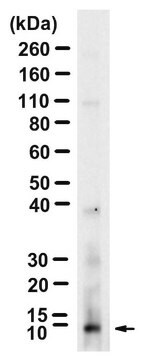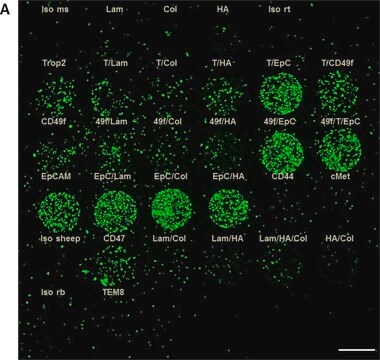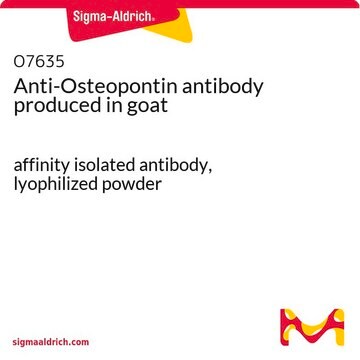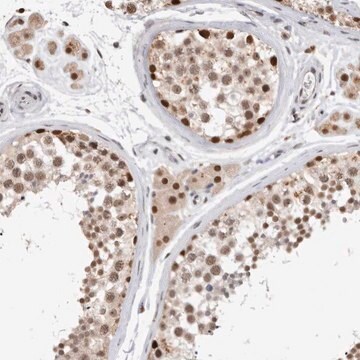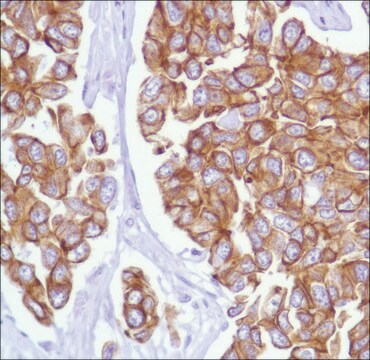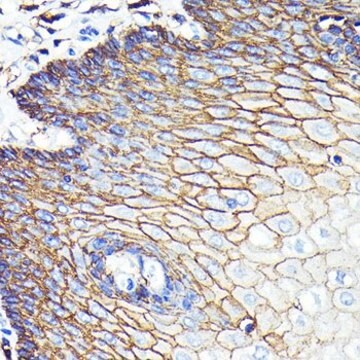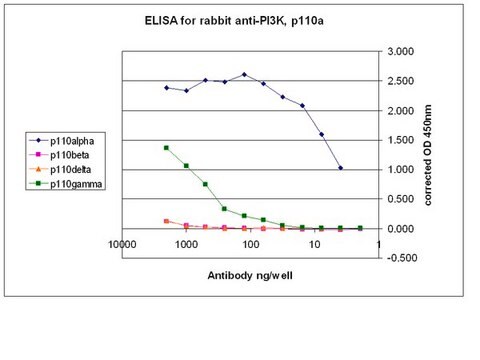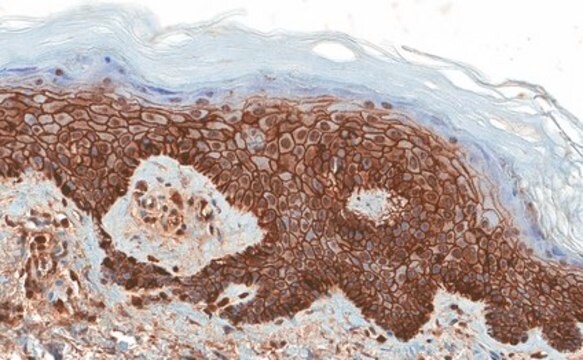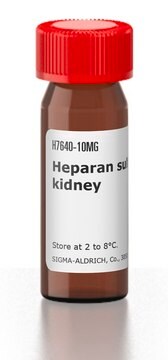推荐产品
生物源
mouse
品質等級
抗體表格
purified immunoglobulin
抗體產品種類
primary antibodies
無性繁殖
5C5, monoclonal
物種活性
human
包裝
antibody small pack of 25 μg
技術
ELISA: suitable
dot blot: suitable
同型
IgG1κ
NCBI登錄號
UniProt登錄號
運輸包裝
ambient
目標翻譯後修改
unmodified
基因資訊
human ... BGLAP(632)
一般說明
Osteocalcin (UniProt: P02818; also known as Bone Gla protein, BGP, Gamma-carboxyglutamic acid-containing protein) is encoded by the BGLAP gene (Gene ID: 632) in human. Osteocalcin is a member of the osteocalcin/matrix Gla protein family and can constitute 1 to 2% of the total bone protein. It is synthesized by osteoblasts and is a major component of the noncollagenous bone matrix. Osteocalcin is synthesized with a signal peptide (aa 1-23), a propetide (aa 24-51) that are cleaved to generate active secreted form of osteocalcin (aa 52-100). Osteocalcin displays a high affinity for calcium and binds strongly to apatite. Sixty to ninety percent of de novo synthesized osteocalcin is incorporated into the bone matrix where it binds to hydroxyapatite during matrix mineralization. The remainder of the osteocalcin is released into the circulation where it can be measured as a sensitive marker of bone formation. Osteocalcin found in serum is almost exclusively derived from the bone formation with little or no contribution from the resorption process. A major feature of osteocalcin is the presence of 3 vitamin K-dependent gamma-carboxyglutamic acid (Gla) residues, which are found in the first helical region and interact with the inter-calcium spacing in the HAP lattice. In humans, the percentage of the circulating osteocalcin that is not gamma-carboxylated is used as a biomarker of vitamin K status. Osteocalcin expression in osteoblasts is stimulated by insulin and adiponectin and osteocalcin enhances insulin sensitivity and differentiation in muscle. Serum osteocalcin is elevated in diseases characterized by increased bone turnover such as osteoporosis, hyperparathyroidism and Paget′s disease, and low in conditions associated with low bone turnover such as hypoparathyroidism and growth hormone deficiency. (Ref.: Kanazawa I (2015). World J Diabetes. 6(18): 1345 1354; Gundberg, CM et al. (2012). Adv Nutr 3 (2): 149-157).
特異性
Clone 5C5 detects human osteocalcin only when not carboxylated on the first glutamic acid residue (GLU17). It does not react with fully carboxylated osteocalcin.
免疫原
A full length recombinant fragment corresponding to 49 amino acids of the mature decarboxylated osteocalcin (with signal peptide and pro regions cleaved off).
Epitope: domain of:
應用
Anti-Osteocalcin (Glu17), clone 5C5, Cat. No. MABS1978, is a mouse monoclonal antibody that detects decarboxylated osteocalcin and has been tested for use in Dot Blot and Enzyme Immunoassay (ELISA).
Dot Blot Analysis: A representative lot detected Osteocalcin (Glu17) in 3xGlu, Glu17, and 3XGla peptides for human OCN (Courtesy of Mathieu Ferron, Ph.D., Montreal Clinical Research Institute, Montreal, Canada).
Enzyme Immunoassay Analysis: A representative lot detected Osteocalcin (Glu17) in human serum.
Enzyme Immunoassay Analysis: A representative lot detected Osteocalcin (Glu17) in human serum.
Research Category
Signaling
Signaling
品質
Dot Blot Analysis: A 1:250 dilution from a representative lot detected decaboxylated Osteocalcin (Glu17) at a wide range of concentrations (0.8 to 1600 ng).
標靶描述
10.96 kDa calculated.
外觀
Protein G purified
Format: Purified
Purified mouse monoclonal antibody IgG1 in buffer containing 0.1 M Tris-Glycine (pH 7.4), 150 mM NaCl with 0.05% sodium azide.
儲存和穩定性
Stable for 1 year at 2-8°C from date of receipt.
其他說明
Concentration: Please refer to lot specific datasheet.
免責聲明
Unless otherwise stated in our catalog or other company documentation accompanying the product(s), our products are intended for research use only and are not to be used for any other purpose, which includes but is not limited to, unauthorized commercial uses, in vitro diagnostic uses, ex vivo or in vivo therapeutic uses or any type of consumption or application to humans or animals.
未找到合适的产品?
试试我们的产品选型工具.
我们的科学家团队拥有各种研究领域经验,包括生命科学、材料科学、化学合成、色谱、分析及许多其他领域.
联系技术服务部门